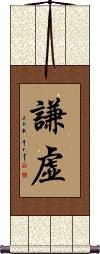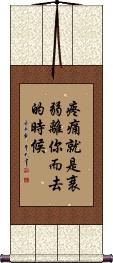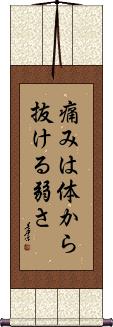Many custom options...
And formats...

Weakness in Chinese / Japanese...
Buy a Weakness calligraphy wall scroll here!
Personalize your custom “Weakness” project by clicking the button next to your favorite “Weakness” title below...
Rise and Fall / Ups and Downs
Eiko-Seisui
This Japanese proverb can be translated as “flourish and wither, prosper and perish,” “life is full of fortune and misfortune,” or simply “vicissitudes of life.”
栄枯盛衰 / 榮枯盛衰 is about the rise and fall of human affairs or the ups and downs of life. Prosperity comes and goes, everything is fleeting and temporary, but like waves, another swell of prosperity may come.
Here's how the Kanji break down in this proverb:
栄 = prosper; thrive; flourish; boom.
枯 = wither; die.
盛 = prosperous; flourishing; thriving; successful; energetic; vigorous; enthusiastic.
衰 = become weaker; decline; get weak; die down; subside; abate; fail.
![]() Notes: The original version of the first character looks like the image to the right. In modern Japan, they simplified that Kanji a bit into the version shown above. If you have a preference for which style is used for your calligraphy, please let me know when you place your order.
Notes: The original version of the first character looks like the image to the right. In modern Japan, they simplified that Kanji a bit into the version shown above. If you have a preference for which style is used for your calligraphy, please let me know when you place your order.
Apparently, with that original version of the first character, this is also used in Korean Hanja. However, I have not confirmed that
it’s
used in the same way or is widely-known in Korean.
Humble / Modesty / Humility
謙虚 is the most common way to say humble or modest in Japanese without a derogatory meaning (some other words suggest weakness, but this version holds a better humble meaning).
In Japanese, the first Kanji means self-effacing, humble oneself, and modesty. The second means void or emptiness.
See Also: Moderation
Pain is Weakness Leaving the Body
I remember this being shouted a lot during U.S. Marine Corps boot camp. 疼痛就是衰弱離你而去的時候 is how to write that phrase in Chinese. At least, this is as close as we could compose/translate it, and hold the full original meaning and connotations.
The version shown here is really, “Pain is weakness leaving your body.” Although it's said in English both ways (the or your), it works better in Chinese with “your.”
Pain is Weakness Leaving the Body
痛みは体から抜ける弱さ is how to write “pain is weakness leaving the body” in Japanese.
I remember this being shouted a lot during U.S. Marine Corps boot camp.
Note: Because this selection contains some special Japanese Hiragana characters, it should be written by a Japanese calligrapher.
The Weak are Meat, The Strong Eat
Meaning: Survival of the fittest
弱肉強食 is a Japanese and Chinese proverb that literally means “The weak are meat; the strong eat” or “The weak are prey to the strong.”
The closest English version is, “Survival of the fittest.” It also fits with the ideas of, “predatory behavior,” or “The law of the jungle.”
Not the results for weakness that you were looking for?
Below are some entries from our dictionary that may match your weakness search...
| Characters If shown, 2nd row is Simp. Chinese |
Pronunciation Romanization |
Simple Dictionary Definition |
柔 see styles |
róu rou2 jou juu / ju じゅう |
More info & calligraphy: Heart of Judo(ant: 剛) softness; gentleness; weakness; (surname, female given name) Yawara Pliant, yielding, soft. |
傷 伤 see styles |
shāng shang1 shang shō きず |
to injure; injury; wound (1) wound; injury; cut; gash; bruise; scratch; scrape; scar; (2) chip; crack; scratch; nick; (3) flaw; defect; weakness; weak point; (4) stain (on one's reputation); disgrace; dishonor; dishonour; (5) (emotional) hurt; hurt feelings To injure, wound, hurt, harm, distress, A tr. of yakṣa. |
創 创 see styles |
chuàng chuang4 ch`uang chuang motomu もとむ |
to initiate; to create; to achieve (something for the first time) (1) wound; injury; cut; gash; bruise; scratch; scrape; scar; (2) chip; crack; scratch; nick; (3) flaw; defect; weakness; weak point; (4) stain (on one's reputation); disgrace; dishonor; dishonour; (5) (emotional) hurt; hurt feelings; (personal name) Motomu |
弱 see styles |
ruò ruo4 jo jaku じゃく |
weak; feeble; young; inferior; not as good as; (following a decimal or fraction) slightly less than (suffix) (1) (ant: 強・1) a little less than; a little under; slightly fewer than; (2) (ant: 強・2) weakness; the weak; low (setting); (suffix) (3) (after a number on the Japan Meteorological Agency seismic intensity scale; e.g. 5弱) (ant: 強・4) -lower (seismic intensity) weak |
瑕 see styles |
xiá xia2 hsia ka きず |
blemish; flaw in jade (1) wound; injury; cut; gash; bruise; scratch; scrape; scar; (2) chip; crack; scratch; nick; (3) flaw; defect; weakness; weak point; (4) stain (on one's reputation); disgrace; dishonor; dishonour; (5) (emotional) hurt; hurt feelings a flaw |
疵 see styles |
cī ci1 tz`u tzu kizu きず |
blemish; flaw; defect (1) wound; injury; cut; gash; bruise; scratch; scrape; scar; (2) chip; crack; scratch; nick; (3) flaw; defect; weakness; weak point; (4) stain (on one's reputation); disgrace; dishonor; dishonour; (5) (emotional) hurt; hurt feelings |
病 see styles |
bìng bing4 ping yamai やまい |
illness; CL:場|场[chang2]; disease; to fall ill; defect (1) illness; disease; (2) bad habit; weakness; fault Illness, disease; to hurt. |
羸 see styles |
léi lei2 lei rui るい |
entangled; lean (obscure) weakness; weakening; tiring weak |
カバ see styles |
kaba カバ |
(noun/participle) (1) cover (e.g. book); coverage; (noun or participle which takes the aux. verb suru) (2) to compensate for (a loss); to offset (a weakness); to back up; (3) kava (Piper methysticum); cava; kavakava; (4) cava; Spanish sparkling wine; (kana only) hippopotamus (Hippopotamus amphibius); (kana only) birch (esp. Japanese white birch); (personal name) Cava |
乘虛 乘虚 see styles |
chéng xū cheng2 xu1 ch`eng hsü cheng hsü |
to take advantage of weakness |
低調 低调 see styles |
dī diào di1 diao4 ti tiao teichou / techo ていちょう |
low pitch; quiet (voice); subdued; low-key; low-profile (noun or adjectival noun) inactive; slow; sluggish; slack; low tone; undertone; dullness; (market) weakness |
弱さ see styles |
yowasa よわさ |
weakness |
弱み see styles |
yowami よわみ |
(a) weakness; shortcoming; failing; sore point |
弱勢 弱势 see styles |
ruò shì ruo4 shi4 jo shih jakusei / jakuse じゃくせい |
vulnerable; weak inferiority; weakness |
弱味 see styles |
yowami よわみ |
(ateji / phonetic) (a) weakness; shortcoming; failing; sore point |
弱点 see styles |
jakuten じゃくてん |
(See 短所) weak point; weakness; shortcoming; defect; flaw; sore spot; tender spot |
弱行 see styles |
jakkou / jakko じゃっこう |
weakness in execution |
強弱 强弱 see styles |
qiáng ruò qiang2 ruo4 ch`iang jo chiang jo kyoujaku / kyojaku きょうじゃく |
strong or weak; intensity; amount of force or pressure (1) strength and weakness; (degree of) strength; (2) stress (of a sound); loudness |
怯劣 see styles |
qiè liè qie4 lie4 ch`ieh lieh chieh lieh kōretsu |
weakness |
挾制 挟制 see styles |
xié zhì xie2 zhi4 hsieh chih |
to exploit sb's point of weakness to force them to do one's bidding |
欠点 see styles |
ketten けってん |
(1) (ant: 美点) fault; defect; flaw; weak point; weakness; shortcoming; drawback; (2) failure (in an examination); failing grade |
濃淡 浓淡 see styles |
nóng dàn nong2 dan4 nung tan noutan / notan のうたん |
shade (of a color, i.e. light or dark) (1) light and shade; shade (of colour, color); (2) depth (of flavor); complexity; strength and weakness (of flavor) thick and thin |
疲態 疲态 see styles |
pí tài pi2 tai4 p`i t`ai pi tai |
fatigued look; signs of weariness; (fig.) weakness (in the stock market etc) |
病癖 see styles |
byouheki / byoheki びょうへき |
bad habit; peculiarity; weakness |
示弱 see styles |
shì ruò shi4 ruo4 shih jo |
not to fight back; to take it lying down; to show weakness; to show one's softer side |
積弱 积弱 see styles |
jī ruò ji1 ruo4 chi jo |
cumulative weakness; to decline (over time); degeneration |
羸弱 see styles |
léi ruò lei2 ruo4 lei jo ruijaku るいじゃく |
frail; weak (noun or adjectival noun) weakness; feebleness; imbecility inferior |
脱力 see styles |
datsuryoku だつりょく |
(n,vs,vi) loss of strength; exhaustion; weakness |
色弱 see styles |
sè ruò se4 ruo4 se jo shikijaku しきじゃく |
partial color blindness; color weakness slight color-blindness; slight colour-blindness |
薄弱 see styles |
bó ruò bo2 ruo4 po jo hakujaku はくじゃく |
weak; frail (noun or adjectival noun) feebleness; weakness; weak slight |
Click here for more weakness results from our dictionary
The following table may be helpful for those studying Chinese or Japanese...
| Title | Characters | Romaji (Romanized Japanese) | Various forms of Romanized Chinese | |
| Rise and Fall Ups and Downs | 栄枯盛衰 / 榮枯盛衰 荣枯盛衰 | ei ko sei sui eikoseisui | ||
| Humble Modesty Humility | 謙虚 | ken kyo / kenkyo | qiān xū / qian1 xu1 / qian xu / qianxu | ch`ien hsü / chienhsü / chien hsü |
| Pain is Weakness Leaving the Body | 疼痛就是衰弱離你而去的時候 疼痛就是衰弱离你而去的时候 | téng tòng jiù shì shuāi ruò lí nǐ ér qù de shí hòu teng2 tong4 jiu4 shi4 shuai1 ruo4 li2 ni3 er2 qu4 de shi2 hou4 teng tong jiu shi shuai ruo li ni er qu de shi hou | t`eng t`ung chiu shih shuai jo li ni erh ch`ü te shih hou teng tung chiu shih shuai jo li ni erh chü te shih hou |
|
| Pain is Weakness Leaving the Body | 痛みは體から抜ける弱さ 痛みは体から抜ける弱さ | itami wa karada kara nukeru yowasa | ||
| The Weak are Meat, The Strong Eat | 弱肉強食 | jaku niku kyoo shoku jakunikukyooshoku jaku niku kyo shoku | ruò ròu qiáng shí ruo4 rou4 qiang2 shi2 ruo rou qiang shi ruorouqiangshi | jo jou ch`iang shih jojouchiangshih jo jou chiang shih |
| In some entries above you will see that characters have different versions above and below a line. In these cases, the characters above the line are Traditional Chinese, while the ones below are Simplified Chinese. | ||||
Successful Chinese Character and Japanese Kanji calligraphy searches within the last few hours...








